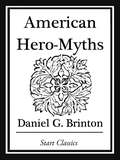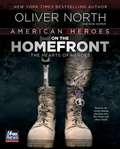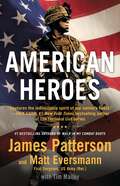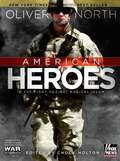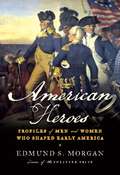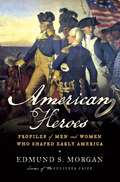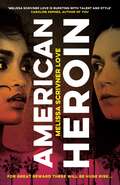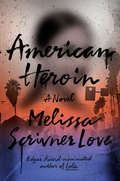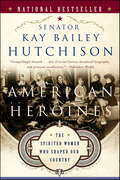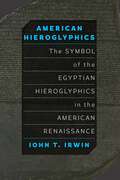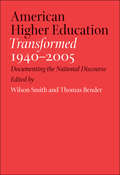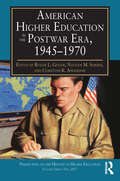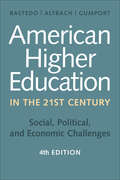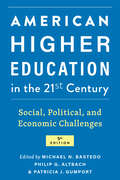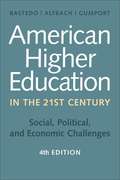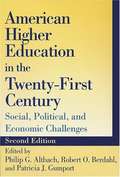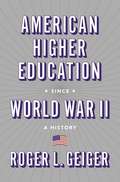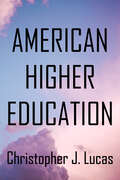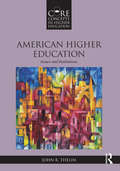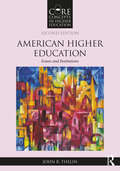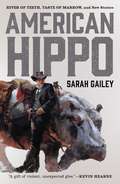- Table View
- List View
American Hero-Myths
by Daniel G. BrintonThis little volume is a contribution to the comparative study of religions. It is an endeavor to present in a critically correct light some of the fundamental conceptions which are found in the native beliefs of the tribes of America.
American Heroes on the Homefront
by Oliver NorthCombat-decorated Marine Oliver North delivers a riveting firsthand account of the extraordinary young American volunteers—the best and bravest of their generation—who stepped forward to defend us from radical Islamic terror. For more than a dozen years North and his award-winning documentary team from FOX News Channel’sWar Stories have traveled to the frontlines of the War on Terror to profile the dedicated men and women who serve our nation in harm’s way and chronicle what it truly means to be a hero. This time, he follows them from the battlefield to the homefront and finds extraordinary inspiration in their triumph over life-altering adversity. In this new volume of his New York Times bestselling American Heroes series, North describes in vivid detail the breathtaking courage, steadfast commitment, and resilient strength of those who serve—and those who love them. The term “selfless devotion” may be a cliché to many in our modern culture—but not to the men and women on the pages of this book. Their stories resound with bravery, a warrior ethos, and spiritual strength that ought to encourage us all. Heroes are people who knowingly place themselves at risk for the benefit of others. They give of themselves, literally and physically. Since the terror attack of 9-11- 01, more than 2 million young Americans have volunteered to serve in difficult and dangerous places. No military force in history has been asked to do more than those who have served and sacrificed in this long fight. They are American heroes. So too are their loved ones here at home. These are their stories.
American Heroes: From the #1 bestselling authors of Walk in My Combat Boots
by James Patterson Matt EversmannFrom the authors of Walk in My Combat Boots, “American Heroes is a gripping collection of firsthand accounts…capturing the indomitable spirit of our nation’s finest&” (Jack Carr, #1 New York Times bestselling author of The Terminal List series). U.S. soldiers who served in overseas conflicts—from World War II, Korea, and Vietnam to Iraq and Afghanistan—share true stories of the actions that earned them some of America’s most distinguished military medals, up to and including the Medal of Honor. They never acted alone, but always in the spirit of camaraderie, patriotism, and for the good of our beloved country. There has never been a better time for all of us to think about duty, sacrifice, and what it means to be an American hero. <br><b>New York Times Bestseller</b></br>
American Heroes: In The Fight Against Radical Islam
by Chuck Holton Oliver NorthI have the best job in all broadcasting. Soldiers, sailors, airmen, Guardsmen, and Marines—those who fight America's wars—are my only "beat." I hang around with heroes for a living.
American Heroes: On the Homefront
by Oliver NorthFrom the New York Times bestselling author of Heroes Proved, a moving collection of "straightforward, honest testimonials to the courage American troops display on and off the battlefield" (Kirkus Reviews).For more than a dozen years, combat-decorated Marine Oliver North and his award-winning documentary team from FOX News Channel's War Stories traveled to the frontlines of the War on Terror to profile the dedicated men and women who serve our nation. This time, he follows them from the battlefield to the homefront and finds extraordinary inspiration in their triumph over life-altering adversity. In this new volume of his New York Times bestselling American Heroes series, North describes the courage, commitment, and strength of those who serve--and those who love them. The term "selfless devotion" may be a cliché to many--but not to the men and women on the pages of this book. Their stories resound with bravery, a warrior ethos, and spiritual strength that will encourage us all. Heroes are people who knowingly place themselves at risk for the benefit of others. Since the terror attack of 9-11-01, more than 2 million young Americans have volunteered to serve in difficult and dangerous places. No military force in history has been asked to do more than those who have served and sacrificed in this long fight. They are American heroes. So too are their loved ones here at home. These are their stories.
American Heroes: On the Homefront
by Oliver NorthFrom the New York Times bestselling author of Heroes Proved, a moving collection of "straightforward, honest testimonials to the courage American troops display on and off the battlefield" (Kirkus Reviews).For more than a dozen years, combat-decorated Marine Oliver North and his award-winning documentary team from FOX News Channel's War Stories traveled to the frontlines of the War on Terror to profile the dedicated men and women who serve our nation. This time, he follows them from the battlefield to the homefront and finds extraordinary inspiration in their triumph over life-altering adversity. In this new volume of his New York Times bestselling American Heroes series, North describes the courage, commitment, and strength of those who serve--and those who love them. The term "selfless devotion" may be a cliché to many--but not to the men and women on the pages of this book. Their stories resound with bravery, a warrior ethos, and spiritual strength that will encourage us all. Heroes are people who knowingly place themselves at risk for the benefit of others. Since the terror attack of 9-11-01, more than 2 million young Americans have volunteered to serve in difficult and dangerous places. No military force in history has been asked to do more than those who have served and sacrificed in this long fight. They are American heroes. So too are their loved ones here at home. These are their stories.
American Heroes: Profiles of Men and Women Who Shaped Early America
by Edmund S. Morgan"A wise, humane and beautifully written book."--Bret Stephens, Wall Street Journal From the best-selling author of Benjamin Franklin comes this remarkable work that will help redefine our notion of American heroism. Americans have long been obsessed with their heroes, but the men and women dramatically portrayed here are not celebrated for the typical banal reasons contained in Founding Fathers hagiography. Effortlessly challenging those who persist in revering the American history status quo and its tropes and falsehoods, Morgan, now ninety-three, continues to believe that the past is just not the way it seems.
American Heroes: Profiles of Men and Women Who Shaped Early America
by Edmund Sears MorganThe last two decades have witnessed an explosion of interest in the founding fathers so intense that a reader or television viewer of today might imagine that America was the creation of beings who were flawless in their wisdom and courage. As Pulitzer Prize-winning historian Edmund S. Morgan shows here, Americans have long been obsessed with their heroes. But, drawing on a lifetime of scholarship, he presents a different cast of characters "among them Indians, witches, heretics, and naysayers," men and women who went against the grain, in addition to the stock figures of our national hagiography. Morgan has mined the seventeenth century and has identified several new heroes, among them Giles Cory and Mary Easty, accused witches, who were put to death when Puritanism went wrong at Salem in 1692. Pressured to reprieve herself by admitting her guilt and naming friends and neighbors as confederates in witchcraft, Easty declared, "I dare not belie my own soul." Her humble statement stands as the ultimate expression of the religious principles that led to the founding of New England, principles temporarily abandoned by the rulers of Massachusetts Bay who tried and sentenced her. While American Heroes celebrates the lives and principles of ordinary Americans, the book also considers the legacy of some of our most prominent colonial and Revolutionary leaders, among them William Penn, Benjamin Franklin, and George Washington. Franklin and Washington are best known for standing against the repressive and often brutal regime of Great Britain's colonial policies, but here Morgan makes the case for their heroism in standing up to their own countrymen. When Americans were demanding precipitate action, Washington and Franklin got the nation off to a good start by knowing when to say no. Whether presenting the scandalous story of a Puritan husband whose on-and-off marriage to a beleaguered Puritan heiress illustrates the nexus between property and sex, or assessing the power of books to subvert the standing order and alter the course of history, American Heroes rises above hagiography in challenging the reader to conceive of American individuality and idealism in new terms. Morgan, who credits his mentor Perry Miller with the best historical mind of his generation, has shown throughout his own career an unrivaled originality and intellectual courage. American Heroes demonstrates Morgan's fascination with our national identity and his abiding affection for the men and women whose character, honesty, and moral courage make plain that heroism in America can be found in unexpected places.
American Heroin: 'A rip-through-it-in-one-sitting thrill ride that will leave readers hooked' Joseph Knox (The\lola Vasquez Novels Ser. #2)
by Melissa Scrivner LoveAmerican Heroin is the eagerly-awaited sequel to Lola, featuring a ruthless woman who will stop at nothing to protect her growing drug empire It took sacrifice, pain, and more than a few dead bodies, but Lola has clawed her way to the top of her South Central Los Angeles neighborhood. Her gang has grown beyond a few trusted soldiers into a full-fledged empire, and the influx of cash has opened up a world that she has never known. But with great opportunity comes great risk, and as Lola ascends the hierarchy of the city&’s underworld she attracts the attention of a dangerous new cartel who sees her as their greatest obstacle to dominance. Soon Lola finds herself sucked into a deadly all-out drug war that threatens to destroy everything she&’s built. But even as Lola readies to go to war, she learns that the greatest threat may not be a rival drug lord but a danger far closer to home: her own brother. Edgy, complex, and breathtakingly propulsive, Melissa Scrivner Love has crafted a novel sure to please not only those who loved her first book but everyone who enjoys a gripping thriller.
American Heroin: A Novel (The Lola Vasquez Novels)
by Melissa Scrivner LoveThe unforgettable protagonist of Lola returns in a gritty, high-octane thriller about a brilliant woman who will stop at nothing to protect her growing drug empire, even if she has to go to war with a rival cartel...or her own familyIt took sacrifice, pain, and more than a few dead bodies, but Lola has clawed her way to the top of her South Central Los Angeles neighborhood. Her gang has grown beyond a few trusted soldiers into a full-fledged empire, and the influx of cash has opened up a world that she has never known--one where her daughter can attend a good school, where her mother can live in safety, and where Lola can finally dream of a better life. But with great opportunity comes great risk, and as Lola ascends the hierarchy of the city's underworld she attracts the attention of a dangerous new cartel who sees her as their greatest obstacle to dominance. Soon Lola finds herself sucked into a deadly all-out drug war that threatens to destroy everything she's built. But even as Lola readies to go to war, she learns that the greatest threat may not be a rival drug lord but a danger far closer to home: her own brother.Edgy, complex, and breathtakingly propulsive, Melissa Scrivner Love has crafted a novel sure to please not only those who loved her first book but everyone who enjoys a gripping thriller.
American Heroines: The Spirited Women Who Shaped Our Country
by Kay Bailey HutchisonAs long as there has been an America, the indomitable spirit of American women has shaped both the country's history and society. Regardless of the time and place these women were born each excelled in her respective field, making it easier for the next generation. This is what makes them heroines. In American Heroines, Kay Bailey Hutchison presents female pioneers in fields as varied as government, business, education and healthcare, who overcame the resistance and prejudice of their times and accomplished things that no woman–and sometimes no man –– had done before. Hutchison, a pioneer in her own right, became the first woman elected to the United States Senate from the State of Texas. Interspersed with the stories of America's historic female leaders are stories of today's women whose successes are clearly linked to those predecessors. Would Sally Ride have been given the chance to orbit the earth had Amelia Earhart not flown solo across the Atlantic Ocean fifty years before? Had Clara Barton not nursed wounded soldiers on Civil War battlefields, aid may not have reached the millions it did while the Red Cross was in the hands of women like Elizabeth Dole and Bernadine Healy. Had Oveta Culp Hobby not been appointed the first Secretary of the Department of Health and Education by President Eisenhower, the country may have been deprived of such leaders as Secretary of State Madeline Albright and National Security Advisor Condoleeza Rice. As a young girl, Senator Hutchison dreamed of an America where the qualifier "the first woman" had become obsolete. The profiles contained in American Heroines, illustrate how her dream is coming true, one courageous step at a time.
American Hieroglyphics: The Symbol of the Egyptian Hieroglyphics in the American Renaissance
by John T. IrwinA sophisticated examination of the American Symbolists, back in print for the first time in more than a decade.The discovery of the Rosetta Stone and the subsequent decipherment of Egyptian hieroglyphics captured the imaginations of nineteenth-century American writers and provided a focal point for their speculations on the relationships between sign, symbol, language, and meaning. Through fresh readings of classic works by Emerson, Thoreau, Whitman, Poe, Hawthorne, and Melville, John T. Irwin’s American Hieroglyphics examines the symbolic mode associated with the pictographs. Irwin demonstrates how American Symbolist literature of the period was motivated by what he calls "hieroglyphic doubling," the use of pictographic expression as a medium of both expression and interpretation. Along the way, he touches upon a wide range of topics that fascinated people of the day, including the journey to the source of the Nile and ideas about the origin of language.
American Hieroglyphics: The Symbol of the Egyptian Hieroglyphics in the American Renaissance
by John T. IrwinHow the discovery of the Rosetta Stone led to new ways of thinking about language: “A brilliant new interpretation of major 19th-century American writers.” —J. Hillis MillerThe discovery of the Rosetta Stone and the subsequent decipherment of Egyptian hieroglyphics captured the imaginations of nineteenth-century American writers and provided a focal point for their speculations on the relationships between sign, symbol, language, and meaning. Through fresh readings of classic works by Emerson, Thoreau, Whitman, Poe, Hawthorne, and Melville, John T. Irwin’s American Hieroglyphics examines the symbolic mode associated with the pictographs.Irwin demonstrates how American Symbolist literature of the period was motivated by what he calls “hieroglyphic doubling,” the use of pictographic expression as a medium of both expression and interpretation. Along the way, he touches upon a wide range of topics that fascinated people of the day, including the journey to the source of the Nile and ideas about the origin of language.
American Higher Education Transformed, 1940–2005: Documenting the National Discourse
by Thomas Bender Wilson SmithThis long-awaited sequel to Richard Hofstadter and Wilson Smith's classic anthology American Higher Education: A Documentary History presents one hundred and seventy-two key edited documents that record the transformation of higher education over the past sixty years.The volume includes such seminal documents as Vannevar Bush's 1945 report to President Franklin D. Roosevelt, Science, the Endless Frontier; the U.S. Supreme Court decisions in Brown v. Board of Education and Sweezy v. New Hampshire; and Adrienne Rich's challenging essay "Taking Women Students Seriously." The wide variety of readings underscores responses of higher education to a memorable, often tumultuous, half century. Colleges and universities faced a transformation of their educational goals, institutional structures and curricula, and admission policies; the ethnic and economic composition of student bodies; an expanding social and gender membership in the professoriate; their growing allegiance to and dependence on federal and foundation financial aids; and even the definitions and defenses of academic freedom. Wilson Smith and Thomas Bender have assembled an essential reference for policymakers, administrators, and all those interested in the history and sociology of higher education.
American Higher Education in the Postwar Era, 1945-1970: Perspectives On The History Of Higher Education (Perspectives on the History of Higher Education)
by Roger L. Geiger Nathan M. Sorber Christian K. AndersonAfter World War II, returning veterans with GI Bill benefits ushered in an era of unprecedented growth that fundamentally altered the meaning, purpose, and structure of higher education. This volume explores the multifaceted and tumultuous transformation of American higher education that occurred between 1945 and 1970, while examining the changes in institutional forms, curricula, clientele, faculty, and governance. A wide range of well-known contributors cover topics such as the first public university to explicitly serve an urban population, the creation of modern day honors programs, how teachers’ colleges were repurposed as state colleges, the origins of faculty unionism and collective bargaining, and the dramatic student protests that forever changed higher education. This engaging text explores a critical moment in the history of higher education, signaling a shift in the meaning of a college education, the concept of who should and who could obtain access to college, and what should be taught.
American Higher Education in the Twenty-First Century: Social, Political, and Economic Challenges
by Michael N. Bastedo, Philip G. Altbach, and Patricia J. GumportAn indispensable reference that everyone concerned with the future of American colleges and universities should acquire.First published in 1999, American Higher Education in the Twenty-First Century offered a comprehensive introduction to the central issues facing American colleges and universities. This thoroughly revised edition brings the classic volume up to date. The contributors have rewritten every chapter to address major changes in higher education, including the rise of organized social movements, the problem of income inequality and stratification, and the growth of for-profit and distance education. Three new chapters cover information technology, community colleges, and teaching and learning.This edition seeks to capture several crucial dynamics in the nexus of higher education and society. Placing higher education within its social and political contexts, the contributors discuss finance, federal and state governance, faculty, students, curriculum, and academic leadership. They also grapple with growing concerns about the future of the academy and reflect more deeply on the racial, ethnic, and socioeconomic diversity within higher education.No other book covers such wide-ranging issues under the broader theme of higher education’s relationship to society. Highly acclaimed and incorporating cutting-edge research, American Higher Education in the Twenty-First Century is now more useful and engaging than ever.Contributors: Michael N. Bastedo, Philip G. Altbach, Patricia J. Gumport, Benjamin Baez, Peter Riley Bahr, Joy Blanchard, Corbin M. Campbell, Melanie E. Corrigan, Peter D. Eckel, Roger L. Geiger, Lawrence E. Gladieux, Sara Goldrick-Rab, Jillian Leigh Gross, D. Bruce Johnstone, Adrianna Kezar, Jacqueline E. King, Aims C. McGuinness, Jr., Michael Mumper, Anna Neumann, Robert M. O’Neil, Laura W. Perna, Gary Rhoades, Roman Ruiz, Lauren Schudde, Sheila Slaughter, Daryl G. Smith
American Higher Education in the Twenty-First Century: Social, Political, and Economic Challenges
by Michael N. Bastedo, Philip G. Altbach, and Patricia J. GumportNow in its fifth edition! An indispensable reference for anyone concerned with the future of American colleges and universities.Whether it is advances in information technology, organized social movements, or racial inequality and social class stratification, higher education serves as a lens for examining significant issues within American society. First published in 1998, American Higher Education in the Twenty-First Century offers a comprehensive introduction to the complex realities of American higher education, including its history, financing, governance, and relationship with the states and federal government. This thoroughly revised edition brings the classic volume completely up to date. Each chapter has been rewritten to address major recent issues in higher education, including the COVID-19 pandemic, the movement for racial justice, and turmoil in the for-profit sector. Three entirely new chapters cover broad-access colleges, race and racism, and organized social movements. Reflecting on the implications of ethnic and socioeconomic diversity within higher education, the book also grapples with growing concerns about the responsiveness and future of the academy.No other book covers such wide-ranging issues under the broader theme of higher education's relationship to society. Highly acclaimed and incorporating cutting-edge research, American Higher Education in the Twenty-First Century is now more useful and engaging than ever.Contributors: Michael N. Bastedo, Philip G. Altbach, Patricia J. Gumport, Peter Riley Bahr, Joy Blanchard, Julia Brickfield, Michael Brown, Katherine S. Cho, Daniela Conde, Charles H. F. Davis III, Hans de Wit, Peter D. Eckel, Martin Finkelstein, Denisa Gándara, Liliana M. Garces, Roger L. Geiger, Leslie D. Gonzales, Jillian Leigh Gross, Jessica Harris, Nicholas Hillman, Julia Rose Karpicz, Robert Kelchen, Adrianna Kezar, Lisa R. Lattuca, Demetri Morgan, Rebecca Natow, Anna Neumann, Audrey Peek, Laura W. Perna, Gary Rhoades, Tykeia N. Robinson, Roman Ruiz, Wonson Ryu, Lauren T. Schudde, Jeffrey C. Sun, David A. Tandberg
American Higher Education in the Twenty-First Century: Social, Political, and Economic Challenges FOURTH EDITION
by Philip G. Altbach Patricia J. Gumport Michael N. BastedoFirst published in 1999, American Higher Education in the Twenty-First Century offered a comprehensive introduction to the central issues facing American colleges and universities. This thoroughly revised edition brings the classic volume up to date. The contributors have rewritten every chapter to address major changes in higher education, including the rise of organized social movements, the problem of income inequality and stratification, and the growth of for-profit and distance education. Three new chapters cover information technology, community colleges, and teaching and learning. This edition seeks to capture several crucial dynamics in the nexus of higher education and society. Placing higher education within its social and political contexts, the contributors discuss finance, federal and state governance, faculty, students, curriculum, and academic leadership. They also grapple with growing concerns about the future of the academy and reflect more deeply on the racial, ethnic, and socioeconomic diversity within higher education. No other book covers such wide-ranging issues under the broader theme of higher education's relationship to society. Highly acclaimed and incorporating cutting-edge research, American Higher Education in the Twenty-First Century is now more useful and engaging than ever.
American Higher Education in the Twenty-first Century: Social, Political, And Economic Challenges
by Philip G. Altbach Robert Oliver Berdahl Patricia J. GumportLargely critical of recent attacks on the state of American higher education coming from advocates of privatization, reinventing government, total quality improvement, and so on, the eighteen contributions in this collection are presented by Altbach (higher education, Boston College), Berdahl (emeritus, higher education, U. of Maryland at College Park), and Gumport (education, Stanford U.) as an attempt to situate American higher education in broad social context in order to evaluate the legitimacy of the arguments of its critics. Papers explore the roles of external constituencies such as the federal government, state governments, the courts, and nongovernmental entities; as well as internal constituencies such as the faculty, the students, and administration. Others examine particular issues, including autonomy and accountability, academic freedom, finance, technology, graduate education, the curriculum, race, and the commercialization of higher education. Annotation ©2004 Book News, Inc., Portland, OR (booknews.com)
American Higher Education since World War II: A History (The William G. Bowen Series #116)
by Roger L. GeigerA masterful history of the postwar transformation of American higher educationAmerican higher education is nearly four centuries old. But in the decades after World War II, as government and social support surged and enrollments exploded, the role of colleges and universities in American society changed dramatically. Roger Geiger provides the most complete and in-depth history of this remarkable transformation, taking readers from the GI Bill and the postwar expansion of higher education to the social upheaval of the 1960s and 1970s, desegregation and coeducation, and the challenges confronting American colleges today.Shedding critical light on the tensions and triumphs of an era of rapid change, Geiger shows how American universities emerged after the war as the world’s most successful system for the advancement of knowledge, how the pioneering of mass higher education led to the goal of higher education for all, and how the “selectivity sweepstakes” for admission to the most elite schools has resulted in increased stratification today. He identifies 1980 as a turning point when the link between research and economic development stimulated a revival in academic research—and the ascendancy of the modern research university—that continues to the present.Sweeping in scope and richly insightful, this groundbreaking book demonstrates how growth has been the defining feature of modern higher education, but how each generation since the war has pursued it for different reasons. It provides the context we need to understand the complex issues facing our colleges and universities today, from rising inequality and skyrocketing costs to deficiencies in student preparedness and lax educational standards.
American Higher Education: A History
by Christopher J. LucasThe roots of controversy surrounding higher education in the US extend deep into the past. This original, incisive history goes far in offering a needed sense of perspective on current debates over such issues as access, costs, academic quality, social equity, and curricula. Eminently readable and always lively, this timely historical account is sure to be an invaluable resource for assessing the present condition and future prospects of American colleges and universities.
American Higher Education: Issues and Institutions (Core Concepts in Higher Education)
by John R. ThelinHigher education in the United States is a complex, diverse, and important enterprise. The latest book in the Core Concepts in Higher Education series brings to life issues of governance, organization, teaching and learning, student life, faculty, finances, college sports, public policy, fundraising, and innovations in higher education today. Written by renowned author John R. Thelin, each chapter bridges research, theory, and practice and discusses a range of institutions – including the often overlooked for-profits, community colleges, and minority serving institutions. A blend of stories and analysis, this exciting new book challenges present and future higher education practitioners to be informed and active participants, capable of improving their institutions.
American Higher Education: Issues and Institutions (Core Concepts in Higher Education)
by John R. ThelinThe latest book in the Core Concepts in Higher Education series brings to life issues of governance, organization, teaching and learning, student life, faculty, finances, college sports, public policy, fundraising and innovations in higher education today. Written by renowned author John R. Thelin, each chapter bridges research, theory and practice and discusses a range of institutions – including the often overlooked for-profits, community colleges and minority serving institutions. In the book’s second edition, Thelin analyzes growing trends in American higher education over the last five years, shedding light on the effects of the COVID-19 pandemic. He covers reconsideration of the rights of student-athletes, provides fresh analysis of the brick-and-mortar campus, and includes a new chapter exploring school admissions, recruitment and retention. Rich end-of-chapter "Additional Readings" and "Questions for Discussion" help engage students in critical thinking. A blend of stories and analysis, this book challenges present and future higher education practitioners to be informed and active participants, capable of improving their institutions.
American Hippies (Cambridge Essential Histories)
by Donald CritchlowIn the late 1960s and early 1970s hundreds of thousands of white middle-class American youths suddenly became hippies. This short overview of the hippie social movement in the United States examines the movement's beliefs and practices, including psychedelic drugs, casual sex, and rock music, as well as the phenomena of spiritual seeking, hostility to politics, and communes. W. J. Rorabaugh synthesizes how hippies strived for authenticity, expressed individualism, and yearned for community. Viewing the tumultuous Sixties from a new angle, Rorabaugh shows how the counterculture led to subsequent social and cultural changes in the United States with legacies including casual sex, natural foods, and even the personal computer. The first short but comprehensive overview to examine the hippie movement in the United States during the late 1960s and early 1970s Describes who became a hippie, what hippies thought, and how they behaved, including their politics Explains why hippies emerged when they did
American Hippo: River of Teeth, Taste of Marrow, and New Stories (River of Teeth)
by Sarah GaileyIn 2017 Sarah Gailey made her debut with River of Teeth and Taste of Marrow, two action-packed novellas that introduced readers to an alternate America in which hippos rule the colossal swamp that was once the Mississippi River. Now readers have the chance to own both novellas in American Hippo, a single, beautiful volume.Years ago, in an America that never was, the United States government introduced herds of hippos to the marshlands of Louisiana to be bred and slaughtered as an alternative meat source. This plan failed to take into account some key facts about hippos: they are savage, they are fast, and their jaws can snap a man in two. By the 1890s, the vast bayou that was once America's greatest waterway belongs to feral hippos, and Winslow Houndstooth has been contracted to take it back. To do so, he will gather a crew of the damnedest cons, outlaws, and assassins to ever ride a hippo. American Hippo is the story of their fortunes, their failures, and his revenge.At the Publisher's request, this title is being sold without Digital Rights Management Software (DRM) applied.
